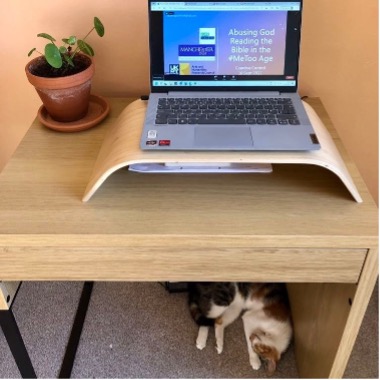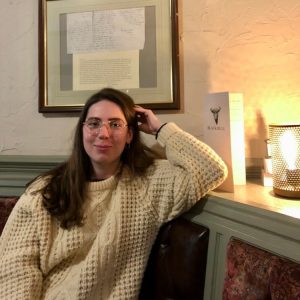
Blog from Rachel Miller on the Abusing God Network’s first colloquium on Coercive Control
Organised by Dr Kirsi Cobb and Dr Holly Morse and with funding from the Arts and Humanities Research Council, the inaugural colloquium of Abusing God: Reading the Bible in the #MeToo Age took place at the University of Manchester and online on Saturday 10 September. Centring around the theme of coercive control, the event involved three sessions and a play performed by Christian organisation Press Red. Each panel consisted of a speaker from an academic background and one from a church or charity context; these presenters each wrote and circulated a paper ahead of the colloquium and explored the potential for collaborative research off the back of their papers. During the event itself, the speakers each delivered a version of their papers and shared on this newfound scope for trans-institutional research; here, the floor was opened to participants in person and online (to the ‘roomers’ and the ‘zoomers’ as I have heard them called!) for Q&A and further discussion.
Further details of the three panel sessions, speakers and papers, are as follows:
Panel 1 – Siobhán Jolley – ‘Yes, You Too: The Magdalene, the Madonna, and Conditioning for Coercion.’ Beth Keith – ‘“Has No One Condemned You? Neither Do I.” Exploring Confession, Absolution, and Trauma Related Shame.’;
Panel 2 – Meghan Hansen – ‘Male Indifference in the Cursers on ‘Daughter Babylon’ in Psalm 137: 7-9 and Isaiah 47: 1-15.’ Robyn Riggans – ‘Voices from the Ground: “Church Is not a Safe Place for Me.”’;
Panel 3 – Katie Cross – ‘“But Love Holds Me There”: The Problem of the Theological Legitimation of Domestic Abuse through the Lens of “Control.”’ Matt Britton – ‘“Why Doesn’t She Just Leave?: An “Applied Theatre” Approach to Engaging the Church with the Issue of Coercive Control.’
Opting to attend the colloquium as a ‘zoomer’, I would say that my experience of the event was not far off that of a ‘roomer’. Cameras were focused on the speakers at the front of the room and though the smartboard could not be seen, any slides used by the presenters were shared digitally throughout the live feed. Microphones were also used by all presenters, and one was passed around the physical attendees too. This use of technology meant that those online saw and heard everything as if they were there in person. Like most people, I have attended countless online events since 2020, and this one was one of the most organised and smoothly conducted of them all. That said, perhaps the only aspect lacking was the ability to connect with other participants: the ‘zoomers’ could submit a question to be asked however the chat function was disabled so we could not speak to one another (a decision taken by the organisers for the purpose of safeguarding and as such one I embrace); similarly, we missed out on chatting with the ‘roomers’ during the reflections and at the breaks. All in all, those attending the event online were not at a disadvantage compared to those participating in person, though in-person attendance may be preferable if one is able and benefits from processing information through discussion with others.
On top of being a ‘zoomer’, I am also a postgraduate researcher at the University of Manchester. While this explains my interest in the academic side of the colloquium, it is also what led me to find the collaborative aspect of the event so compelling. Over the course of the panels, the presenters from the academic perspective repeatedly spoke of the need for academics to climb down from their ‘ivory towers’ to witness the use (and misuse) of the Bible and hear the testimonies of survivors of abuse at ‘ground level’, actions which church and charity organisations are already carrying out. This point made me all too aware of the distance between my own research and the real, lived experiences of others. However, the collaborative aspect of the colloquium demonstrated to me that bridging this gap is not only possible but also essential. Each panel successfully showed that trans-institutional work can be done, it must be done, and that this work is just beginning.
Echoing a similar petition was Press Red’s play ‘Control’: a striking depiction of coercive control in a Christian, heterosexual relationship; taking place in non-theatre spaces and close to the audience to mimic the claustrophobia experienced by the abused in a relationship with the abuser. A reading and re-reading of 1 Corinthians 13: 4-13, the (in)famous love passage, powerfully encapsulated the (mis)use of the Bible: though an English translation was quoted verbatim by the abuser; a paraphrase by the abused most closely reflected a recognisable conception of love. Matt Britton, a writer of and actor in the play, described ‘Control’ as having two halves: the first is the play itself; and the second is the call to action, the appeal to listen to the stories of survivors.
At the end of the event, I was left with a lot of food for thought but also hungry for more. Thankfully, the second colloquium as part of the Abusing God Network has been confirmed for 22 April 2023! The call for papers is out now and more information can be found here.

Rachel is a second year PhD student in the department of Religions and Theology at the University of Manchester. Focusing on Biblical Studies in general and the Hebrew Bible in particular, her research centres around women’s agency, men’s violence, and victim-blaming.

0 Comments